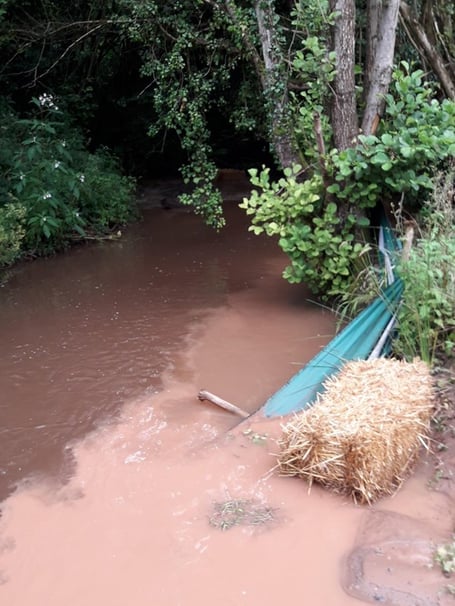Another spate of sewage releases into our rivers after heavy rains follows the release of the government’s timetable for cleaning up our water in the ‘Storm Overflows Discharge Reduction Plan’.
Swimmers, anglers and wildlife groups have expressed frustration at the timetable: a target date of 2050 for improving all storm overflows, and 2035 for designated bathing areas. For the coming decade, progress will be limited: only 14 per cent of storm overflows improved by 2030, and 38 per cent of high priority sites for wildlife or swimming, condemning another generation of children to play and swim in polluted water, and many more years before our rivers run clear and alive with wildlife.
The water companies have had a legal duty under the Water Industry Act 1991 to maintain our wastewater infrastructure, under which sewage dumping was illegal except in exceptional circumstances. The health of our waterways was steadily improving, with fish and otters returning to our rivers. But over the last decade, wildlife groups have been raising the alarm on the reversal in the health of our rivers, with otter numbers declining. What went wrong and what were the regulators doing?
Ofwat regulates the private water companies and is, according to its website, “a non-ministerial government department, established in 1989 when the water and sewerage industry in England and Wales was privatised”. It is overseen and funded by Defra under the scrutiny of the Environment Minister. Ofwat states, “We put the environment at the heart of everything we do, ensuring that water companies protect and improve the environment for future generations.” The regulator can fine companies up to 10 per cent of their annual turnover.
In June 2022, Ofwat announced: “As we gather and analyse more information, including data on storm overflow spills, our concerns have grown further about South West Water’s operation of its wastewater assets and environmental performance. As a result, we have opened an additional enforcement case into South West Water.” One has to ask why it took Ofwat until 2022 to identify a problem with the sewage spills by South West Water.
The Environment Agency is responsible for monitoring the water quality of our rivers and regulating discharges into them by water companies and agriculture. Its enforcement activities are funded by Defra, again headed by the Environment Minister. From 2010, the government adopted a policy of self-monitoring of discharges by the water companies and farmers themselves, and withdrew funding for monitoring. From 2010/11 to 2019/20 the core funding from Defra for the Environment Agency’s enforcement work on storm sewage discharges was reduced by 80 per cent. And the Environment Minister from 2014 to 2016, Liz Truss, oversaw efficiency plans reducing Environment Agency funding by £235m, including a £24m cut for environmental protection, such as surveillance of water companies to prevent sewage spills, between 2014 and 2017.
The Environment Agency now does not have sufficient staff to investigate incidents properly. The National Incident Recording System shows that in 2021, there were 116,000 potential incidents reported, and only 8,000 were attended. This hands-off approach was also extended to the Environment Agency’s farm inspections. Pollution runs off farms from animal manure, pesticides and fertilisers into rivers. In 2015, Environment Secretary, Liz Truss, told Parliament “We have seen a reduction of 34,000 farm inspections a year and an 80 per cent reduction in red tape from Defra”. In 2018-19, inspectors visited only 403 farms to check for activities causing water pollution out of 106,000 registered farms in England. The wildlife group WildFish calculated that at that rate, farms could expect an inspection every 263 years.
Self-monitoring has had devastating results on our water quality. While the process of regulation has been as murky as our river water, the solutions are crystal clear. WildFish is calling on the government to increase the ambition in its ‘Storm Overflows Discharge Reduction Plan’, raising the targets and bringing forward the completion dates. Government should require water companies to make up for the years of a lack of investing in our wastewater infrastructure by rapidly investing now. These costs should not all be passed onto us in our water bills, but be borne in part by the water companies themselves in recognition of the high profits of the last decades.
Ofwat, as a government department, needs to provide effective and transparent regulation of the water companies, stepping up its enforcement activities. While the government needs to properly fund the Environment Agency to enable it to do its job of monitoring pollution incidents and taking action against infringements.
What can we do? Reducing our water consumption and the amount of wastewater that leaves our homes will reduce pressure on storm overflows. Don’t let fats and oils go down the sink, and never dispose of wet wipes or other plastics in toilets that can block sewer pipes.
The use of impermeable surfaces for patios or plastic grass in our gardens increases the run-off of rainwater into drains, overwhelming the sewage system. Rainwater can be captured and directed to soakaways, a below ground structure that holds excess water before it soaks away naturally, and to rain gardens, a shallow depression planted with native plants that captures and absorbs stormwater into the ground.
We can support grassroots groups calling for change: The Rivers Trust (theriverstrust.org) working to clean up and restore our rivers; WildFish (wildfish.org) acting to halt the collapse in wild fish populations in fresh and coastal waters; and River Action UK (riveractionuk.com) campaigning against river pollution.
And remember, there is nothing inevitable or normal about the dire state of England’s rivers and bathing waters.





Comments
This article has no comments yet. Be the first to leave a comment.